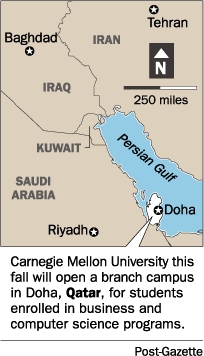[IP] CMU to open branch campus in Persian Gulf
CMU to open branch campus in Persian Gulf
Tuesday, February 17, 2004
By Bill Schackner, Pittsburgh Post-Gazette
<http://www.cmu.edu>Carnegie Mellon University will enroll its first
students in Qatar this fall on a new branch campus whose cost -- several
hundred million dollars -- will be borne by a foundation in the oil-rich
Persian Gulf nation.
[]
176de7c7.jpg
[]
The campus, dubbed "Carnegie Mellon University in Qatar," is expected to
open in September on a sprawling development named Education City now under
construction in the desert near Doha, the capital. The complex is funded by
the <http://www.qf.edu.qa/default.htm>Qatar Foundation for Education,
Science and Community Development, which has ties to the nation's ruler.
The 10-year agreement announced yesterday follows similar deals by Qatar
with several other elite American institutions, among them Cornell
University. Each received financial incentives from the foundation to
establish educational programs for Qatari citizens.
Initially, Carnegie Mellon plans to enroll 50 students in undergraduate
business and computer science programs, but envisions an eventual
enrollment of 400, Provost Mark Kamlet said. Eventually, 40 faculty and 50
staff will work there, many relocating with their families from the
Pittsburgh campus.
The foundation committed $750 million toward Cornell's establishment of a
medical college in Education City. The parties did not disclose a figure
yesterday for the Carnegie Mellon deal, but Kamlet estimated that the
operating expense the foundation will face "is likely to be several hundred
million" over 10 years.
In addition, the foundation is making an unspecified gift to Carnegie
Mellon likely to be used to fund endowed chairs. Those teaching on the
Qatar campus will receive a 25 percent salary premium, compensation during
the summer even when they do not teach, plus a housing allowance and
tuition aid to send their children to K-12 schools, Kamlet said.
And, Carnegie Mellon will get intelligence and security assistance funded
by the foundation to guard against risks, including terrorist attack. The
foundation also has made financial arrangements should the campus need to
be evacuated, Kamlet confirmed.
Once opened, it will be Carnegie Mellon's only branch outside the United
States. Its other branch is in California's Silicon Valley.
The move fits with the university's push in recent years to increase its
presence overseas, officials said. In addition to traditional distance
learning and exchange programs, Carnegie Mellon also offers master's degree
programs in Greece, Korea, South Africa, England, Germany, Singapore and
Switzerland, and it has established formal educational partnerships in
Taiwan, India, Brazil and Mexico.
"The education development in Qatar presents us with an extraordinary
opportunity to make contributions to the region and to the world that are
important and lasting," Carnegie Mellon President Jared L. Cohon said in a
statement. "This initiative will also advance significantly our strategic
priority of internationalizing Carnegie Mellon."
Nevertheless, in a post-Sept. 11 world, the choice of locations is an
especially tricky one for a range of reasons, from stark cultural
differences to personal safety. Qatar, whose population is largely Muslim,
is progressive enough that women run for office. Yet they often cover their
heads in public, a symbol to some of the differences arriving Americans
will face. And the war with Iraq and continuing bloodshed in that country
illustrate to some the dangers Americans could face in the region.
Peggy Knapp, an English professor and chair of the faculty senate, has
heard a range of opinions favorable and otherwise in recent months.
"I don't hear the extreme 'Don't go' anymore. I do hear 'Be careful about
this, be careful about that' '' she said.
The foundation has assured Carnegie Mellon autonomy in developing
curriculum, but some faculty are concerned about potential mine fields as
they decide what sort of general education courses to offer in a part of
the world where American ambitions are suspect.
"What kind of history do we want to teach?" Knapp asked. "We have a course
in western civilization. Would we teach that course?"
The Qatar Foundation is headed by Sheikha Mozah Bint Nasser Al Missned, the
wife of the nation's ruler. She has pledged to absorb costs associated with
the development.
In addition to Cornell, several institutions already operate in the
sprawling Education City complex. Virginia Commonwealth University offers a
fashion and interior design program for Qatari women, and Texas A&M
University offers a program in petroleum engineering.
The complex is intended to serve students from kindergarten through
postgraduate studies.
Kamlet said Carnegie Mellon has attempted to quell concerns about safety
and has offered assurances that the new operation will not divert focus
from the main campus in Pittsburgh. In an interview with the Post-Gazette
last fall, Chuck Thorpe, named to head the new campus, said his time in
Qatar left him confident about security.
-------------------------------------
You are subscribed as roessler@xxxxxxxxxxxxxxxxxx
To manage your subscription, go to
http://v2.listbox.com/member/?listname=ip
Archives at: http://www.interesting-people.org/archives/interesting-people/

